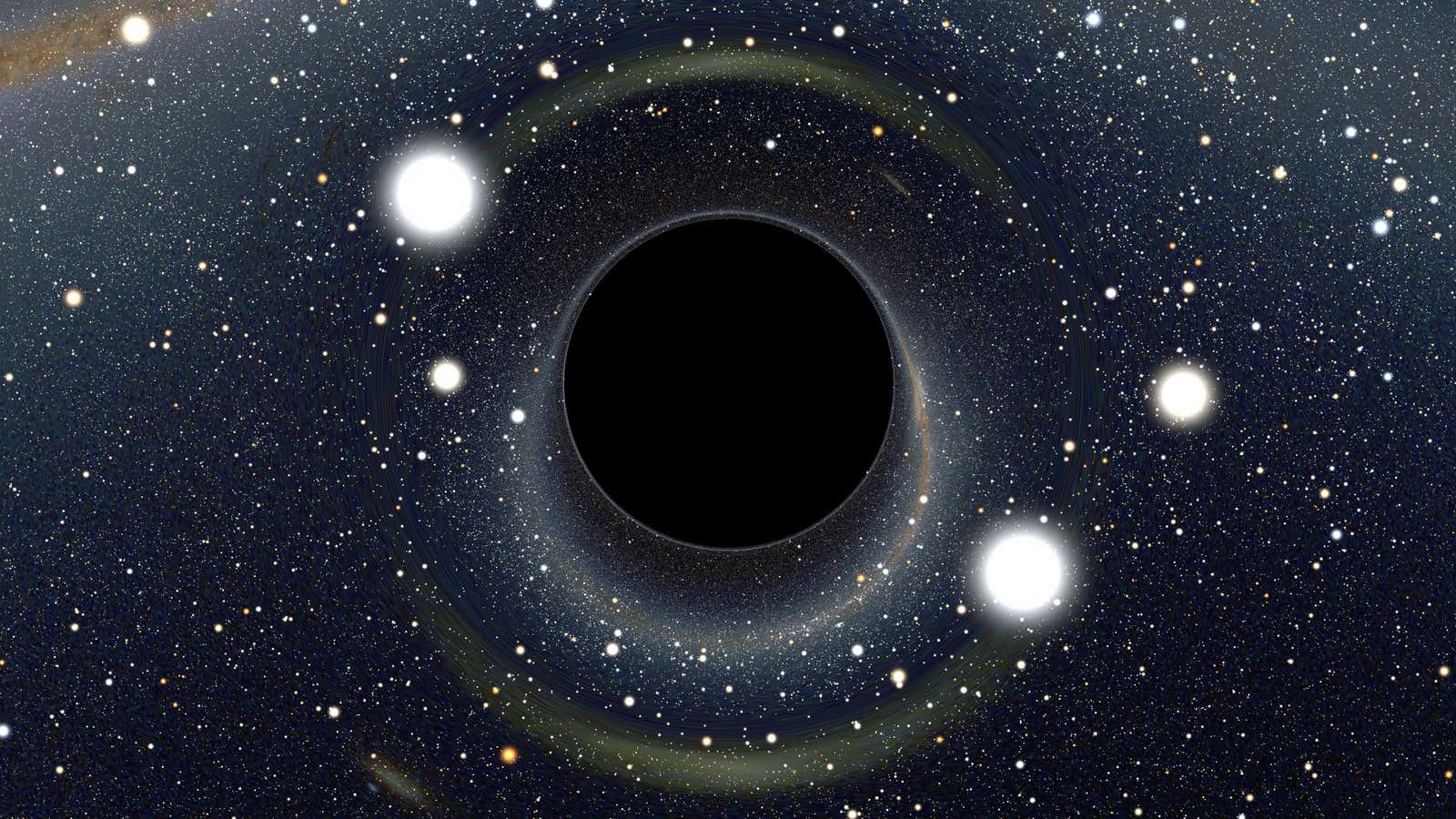This post has been corrected.
If you find yourself stuck inside a black hole, Stephen Hawking says not to panic: You may die, but all traces of your existence may not be lost forever.
Current science suggests that a black hole’s gravity is so strong that absolutely nothing—not even light—can escape once inside. They are cosmic vacuums of terrible, unthinkable power… and there are about 100 million of them in our galaxy alone, including an enormous one at the center that’s billions of times bigger than the sun. Fun stuff.
But perhaps there is hope after all. Hawking, the most famous physicist in the world, has a new theory about black holes, and when Hawking theorizes, people listen. Much of what we already know about black holes is because of Hawking—in fact, there are even concepts named after him. So it’s no trivial matter when he has a new idea.
Speaking at the KTH Royal Institute of Technology in Stockholm, Hawking argued that information that is sucked into a black hole is not doomed to remain there forever. “There’s a way out,” he said.
For decades, physicists have been perplexed by the question of what happens to the information of particles passing through black holes. (Physicists define “information” to be all the properties of a particle—it’s a technical term not to be confused with its more universal meaning). Quantum mechanics says information can’t be permanently destroyed. But if information enters a black hole and cannot escape, then to all intents and purposes, it has been destroyed. And that seems to violate the laws of quantum physics.
So what’s the solution? Hawking now believes that the information never really enters the black hole to begin with.
“I propose that the information is stored not in the interior of the black hole as one might expect, but on its boundary, the event horizon,” he said.
If you’ve seen Interstellar, you’re familiar with the event horizon—it’s essentially the boundary that delineates the point of no return. Once past it, the black hole has you in its nightmarish forever-embrace.
What happens on the event horizon is rather complex, and even physicists struggle to describe it. One analogy, based on a theory devised by the physicists Leonard Susskind and Gerard ‘t Hooft, is that as a body falls into a black hole, its information is captured and stored on the event horizon a bit like a flat piece of holographic film can capture and store the information associated with a three-dimensional object. Though you may be lost inside the black hole, the essence of you—the information about you—will stay smeared on the event horizon just outside.
Hawking’s theory is that this information can then escape again. In one of the previous discoveries for which he’s famous, he found that black holes aren’t perfectly black: They give off energy, called Hawking radiation, which is created very near the event horizon by small energy fluctuations in space. This outgoing energy, Hawking now theorizes, can then pick up information that was stored on the event horizon from objects that fell in, and help it escape.
Hawking’s idea isn’t entirely new: In fact, t’ Hooft made a similar proposal nearly two decades ago (paywall). It’s still unclear just where the differences lie, but it may be that Hawking has resolved some previous difficulties with the theory.
Though the information might have escaped the black hole, it’s not exactly its former self. “The information about ingoing particles is returned, but in a chaotic and useless form,” Hawking said. “For all practical purposes, the information is lost.”
That said, for it to be ”lost” outside of a black hole is still probably better than being lost inside of one. Hawking even suggested that the information could come out in another universe. “The message of this lecture is that black holes ain’t as black as they are painted,” he said. “They are not the eternal prisons they were once thought.”
None of this is to suggest a human being could survive being consumed by a black hole (most scientists believe the intense tidal forces would snap you like a twig before you could say “McConaughey”). But it’s comforting, perhaps, to know that if you were to get devoured by the universe’s apex predator, the essence of you would, in however limited a sense, stay around.
This post was altered to both correct and clarify some aspects of the scientific explanation. The headline was also changed, as an earlier headline implied that someone could escape from a black hole intact.




